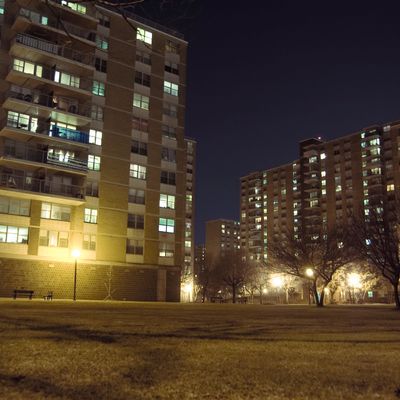
Last October in Charlotte, Donald Trump detailed his vision for bringing “urban renewal” to America’s “inner cities.”
“The conditions in our inner cities today are unacceptable,” Trump said, before lamenting that the United States had “wasted $6 trillion on wars in the Middle East that have produced only more terrorism, more death, and more suffering — imagine if that money had been spent at home.”
Seven months later, the Trump administration has made a neuroscientist turned motivational grifter the head of Housing and Urban Development; put a wedding planner in charge of the largest affordable-housing program in the country; and proposed $7 billion in cuts to HUD’s budget, so as to finance a large increase in military spending.
But if you think that means the president has betrayed his vow to look out for America’s “forgotten men and woman,” think again: Trump’s proposed cuts to HUD have been carefully tailored to prevent everyday, salt-of-the-Earth, billionaire landlords from experiencing any pain.
As the Washington Post reports:
President Trump’s budget calls for sharply reducing funding for programs that shelter the poor and combat homelessness — with a notable exception: It leaves intact a type of federal housing subsidy that is paid directly to private landlords.
One of those landlords is Trump himself, who earns millions of dollars each year as a part-owner of Starrett City, the nation’s largest subsidized housing complex. Trump’s 4 percent stake in the Brooklyn complex earned him at least $5 million between January of last year and April 15, according to his recent financial disclosure.
… The budget calls for a nearly 29 percent cut, or $1.8 billion, to public housing and a 5 percent drop, or nearly $1 billion, in vouchers that allow tenants to use the aid on the housing of their choice, according to Douglas Rice, a senior policy analyst at the Center on Budget and Policy Priorities. In contrast, the program that directs money to Starrett City and other privately owned housing would see a reduction of about half a percent, or $65 million, from its $10.8 billion allocation.
At first blush, this looks like a blatant expression of Trump’s kleptocratic ambitions. The president has found myriad ways to derive personal profit from his public office, but few have presented a conflict of interest this vivid. Does the administration really believe that subsidizing private landlords for accepting low-income tenants is a more cost-efficient means of providing affordable housing that publicly run facilities?
This doesn’t look like a policy made on the basis of a white paper, or on any coherent conception of the public good, but rather, on what was best for someone well-connected.
But, then, one could say the same thing about throwing millions of people off of Medicaid to finance a capital-gains tax cut for wealthy investors. And Trump didn’t need to engage in any conspicuous corruption to convince the congressional GOP to produce such a proposal.
It’s possible that the president actively intervened in the budget-drafting process to protect his interest in Starrett City. Lord knows, Trump isn’t above protecting tiny fractions of his wealth through illicit means — the man paid legal settlements through his charity.
But by all appearances, Trump did not have the interest or attention span to supervise his administration’s budget process. And the fact that a Republican White House would find a way to gut affordable-housing programs — without hurting billionaires who inherited federally subsidized rental complexes from their dads — doesn’t require any extraordinary explanation. The Republican Party has long been a dutiful defender of any form of government welfare that benefits the powerful.
The scandal here isn’t that Trump forced the GOP to put his financial interests above the public good — it’s that there’s no reason to believe he needed to.






























